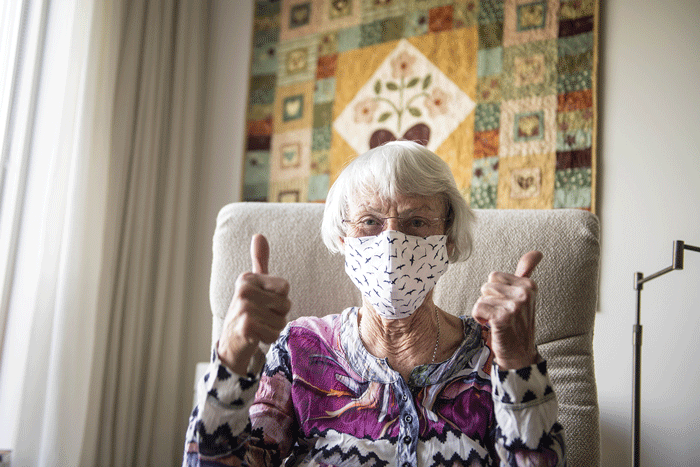
In light of the recent resurgence of COVID-19 nationwide, Dr. John Krueger, under secretary of health for the Chickasaw Nation, says wearing masks remains a key component in limiting the pandemic’s spread.
“What we’re seeing in Texas is beginning to slowly come across (Oklahoma’s) borders,” Dr. Krueger said. “This is a time to be vigilant. We want to keep people safe without the need to shut down our economy or overwhelm our medical services. For this reason, we want to encourage everyone to wear a mask and practice social distancing when out in public or when in groups of people.
“We have good evidence that this works and can be an effective alternative to closing the economy; however, it requires that everyone do their part and participate.”
Krueger said studies have shown wearing a mask may reduce COVID-19’s transmission rate by as much 80-90%. Without wearing a mask, transmission of COVID-19 to others is much more likely, he said.
“Since most individuals with COVID-19 look healthy and have no or limited symptoms, it is difficult to tell who may be spreading the virus. For this reason masks are a simple and effective intervention that can reduce the risk of infection.”
Research has demonstrated a buffer distance of three feet when talking with others is beneficial, but six feet of separation is ideal.
“If you can stay a six-foot distance away from people, especially when you’re inside, that makes a massive difference,” he said.
“There have been several studies on how far the water droplets in our breath travel. If I’m just speaking normally without the mask, when I’ve not been walking around or running, the droplets go about the length of your arm.”
Even a slight cough sends particulates four-to-six feet. A strong cough can result in launching them up to 15 feet or more, he said. The same is true with a big sneeze.
“Masks stop almost all respiratory water droplets that are present in the air when we talk, cough or sneeze. The mask has a small effect on you breathing in another person’s respiratory droplets, but it really helps prevent you from spreading your respiratory droplets with others.”
Krueger said prior to the onset of this pandemic, it was far from certain that masks helped to stem the spread of influenza or other viruses.
“A lot of research was done really quickly, necessity being the mother of invention. Researchers had people cough and sneeze with masks on and then they took a radiolucent tracer and a blacklight and saw how far particles spread.”
Particles didn’t spread when the test subjects wore masks.
“If you wore a mask, very little if any particle spread. This has now been extrapolated to human studies. The evidence is mounting that if you wear a mask, it keeps other people from being infected.” he said.
“Just talking, or if you cough or sneeze, even if just a small, inadvertent cough that we probably do several times a day, you can spread the virus. You can imagine that happening at a dinner table while you’re out at a café or having dinner with friends.
“COVID-19 loves respiratory droplets. It especially likes to hitch a ride on those small respiratory molecules coming out of your mouth and nose. COVID-19 is so tiny, hundreds of thousands of viruses can flood on just one microscopic particle.
“The more respiratory droplets you inhale or that get into your nose or eyes, the more likelihood you have of being infected. There appears to be a relationship with how much exposure you have and how likely it is you will get sick or suffer complications of COVID-19.”
Wearing masks outdoors is also advisable.

“It would be helpful to wear a mask outside because it really does help stop the spread of infection to keep you and your family and people in the community from getting infected. Many times we are closer to one another than we recognize. Wearing a mask is most helpful when we are in crowds and around others. If you’re completely alone and away from everyone else outdoors, then it would be acceptable to not wear a mask in that situation.”
Krueger says covering one’s nose is as important as covering the mouth.
“We breathe in and breathe out air through our mouth and our nose. The mouth is going to get the most droplets out, but we should really cover both our mouth and our nose. When you sneeze, or when you exhale through your nose, the diameter of the nasal passage is basically the same thing as a water hose, if you think about it. It creates a force jet of air that is coming out.”
Krueger said healthcare providers wear masks because they work.
“We all wear masks here at Chickasaw Department of Health. If it didn’t work, we wouldn’t wear them. They do stop most of the particles from coming out. Even if a particle gets through, it doesn’t go as far. Getting infected with one COVID virus probably won’t make you very sick. Getting infected with a hundred thousand COVID viruses all at one time can make you really sick.”
He said avoiding large groups is still prudent.
“Avoid attending large group events such as funerals, concerts, sporting events, social events and such if there is not thoughtful social distancing. If people are not wearing masks, in close proximity and likely sharing respiratory droplets with one another, it is not advisable. If you have to attend such an event, then it is advisable to wear a mask and practice social distancing.
“We continue to see well intentioned people who attend events without adhering to social distancing, wearing masks and/or washing hands who are becoming infected. This has resulted in increased spread of COVID-19 and in some cases hospitalization and preventable deaths,” he said.